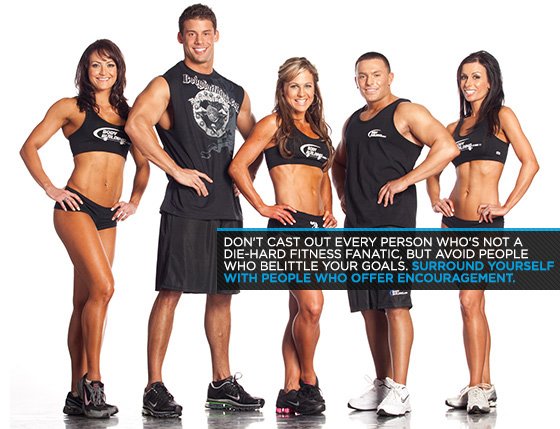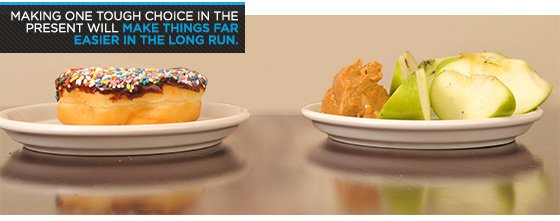
Whether you're trying to lift more, gain mass, or get lean, mental strength will be the key to your success. Your goals may be physical, but your mind controls everything you do.
Just read some biographies of great bodybuilders, lifters, football players, and even runners. Their sports may be different, but all true champions reach the top by honing their mental game. Almost every trainee has a capable body; it's the willing mind that sets the successes and failures apart!
Even if you're not a pro athlete, don't think you can get away with a mediocre mentality. Whether you want to gain five pounds of muscle or lose pounds of fat, you'll need to make big changes to your habits, work ethic, and lifestyle.
Those big changes don't come without strengthening and improving your mind. Your work is never done. It might be as tough for a newbie just to reach the gym as it is for a world-class bodybuilder to prep for a contest. Your journey, however, is about you.
Feeling the pressure? I sure hope so! It's all on you to get results, but that just means you also have the power to make things happen. With a few changes to your mindset, you can make your daunting goals seem like obstacles you just can't wait to tackle! To help, here are six of my favorite tips for improving mental strength.
1 / Know What You Want
Before starting on your journey, you've got to know where you're going. What do you want to accomplish with your body? Are you a young guy looking to get big, or do you want to lean down? Do you want to focus on strength for a sport, or would you rather focus on mass? Do you have dreams of becoming a professional, sponsored bodybuilder or fitness model? It's your body, your mind, and your choice. Remember that!
Despite the simplicity, answering the question "what do you want?" is difficult for most people. One reason that question is so hard is that it forces you to come to terms with your current state of affairs. You might want to be a behemoth bodybuilder, for instance, but if you're already overweight to an unhealthy level, then gaining more weight isn't a great idea. You'll have to diet first, and that sucks! It's a lot easier in the long run if you're honest with yourself and honest about your goals.

Outside influences can also make it hard to focus on your personal goals. Even well-meaning friends and family might try to discourage you from spending too much time, money, or energy on bodybuilding and fitness. Don't cave in, but don't ignore them, either. Think about what it's going to take to achieve your goals. What sacrifices and trade-offs are you going to have to make? By taking your loved ones into account, you'll feel a lot more solid about your decision. Those day-to-day challenges of training and dieting will become a lot more manageable when you're sure of your goals.
2 / Surround Yourself with Positive People
Once you decide to change your body, you might find that all sorts of previously pleasant people start to become discouraging. It's rarely anything overt, though. You'll just hear off-hand comments about your "Spartan" diet or "obsessive" training schedule, and some people will not-so-playfully poke fun at you for taking fitness seriously.
In the long run, these people can poison your progress. Outside negativity will eventually wear down even the most strong-willed, independent-minded person. And, even if you never cheat on your diet or miss a workout, constant negativity will cause you some serious stress. This is a real progress-killer for bodybuilders and lifters.

While you always have to deal with stressful people, the trick is to minimize their influence on your life. You don't need to cast out every person who's not a die-hard fitness fanatic, but avoid people who belittle your goals.
Just as importantly, surround yourself with people who offer encouragement. Even if you train by yourself, try to spend time with other lifters and athletes who are just as serious as you. You won't need to rely solely on your internal motivation when you have others holding you accountable; their progress can inspire you to be better.
3 / Do What You Hate!
If you want to make everything else in your routine seem a little easier, aggressively tackle the stuff you hate the most. Dreading your next leg day? Do double your normal volume on squats! Is cardio getting your down? Crank up the treadmill speed and tough it out. Getting a little sick of your diet? Try eating everything with zero spices or herbs for a few days and see if your normal meals don't seem a little less boring.
You can only make so many tough choices per day. It's a lot easier to fall off the wagon when every meal and every workout feels like a burden. By forcing yourself to do the hard stuff, you effectively make all of exercise and dietary habits "easier," freeing up your mental energy for other tasks.
It's even more important to apply this principle outside the gym. If you make tough choices for a living, you're probably more stressed than most people. A high-stress life makes mustering the motivation to train hard and eat right next to impossible. Tackle big challenges in your career and personal life, and your "normal" activities like lifting and dieting will seem easy in comparison.
4 / Maintain Momentum
"The highs are high, and the lows are lower." That old adage applies to most endeavors, and fitness is no exception. For me and most of my clients, training hard and eating right becomes easier the longer we do it. Like any other habit, they are tough to start, but even tougher to break.

Consider your own momentum the next time you think about skipping a workout or having a cheat meal. Is it worth it? You won't just suffer the ill effects of that one bad decision, you make it easier to slip up in the future.
Making one tough choice in the present—sticking to your diet, finishing your workout, or going to bed on time—will make things far easier in the long run. You won't have to "torture" yourself daily when your now-difficult routine becomes second nature. Consistent clean eating and training will make you look and feel better! The more your body improves, the less you'll be tempted to return to your smaller, weaker, fatter, or unhealthy self.
5 / Set Short- and Long-term Goals
When you try to improve your body, one of the worst things you can do is to become complacent. It's fine to take a break now and again. Even pro bodybuilders have "maintenance" periods, but you need to keep new goals in mind if you want to make continual progress.
To keep yourself moving forward, have short- and long-term goals going at the same time. Say you want to increase your squat. If you're currently hitting 225 for five reps, you might have a short-term goal of getting 275 for five reps. Don't stop there! Think about how much stronger you want to be and set a lofty goal: try for 405, 495, even 585 for five reps!

Constantly accomplish and update your short-term goals, but always have that long-term motivation to keep you going. Even when you slip or take short breaks, those big goals will keep you focused and maintain your momentum.
6 / Embrace Failure!
It might hurt to hear this but, you should know that you are going to fail, and probably more than once before you reach your ultimate potential.
Even if you exert the utmost control over your diet and training, you're going to have setbacks like bad workouts, periods of low energy, injuries, and external stress.
Know that this isn't an excuse to be undisciplined, but an understanding that you'll have to stay in the game for the long haul. If you don't understand the likelihood of occasional setbacks, every mishap will seem like the end of the world.
Keep those failures to a minimum by remembering that you can never be forced to eat bad foods or sit on the couch instead of going to the gym. Optimize everything you can control, and understand that the things you can't control may sometimes bring you down. The right mindset will allow you to bounce back as soon as possible!

